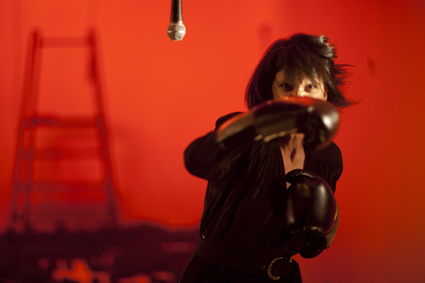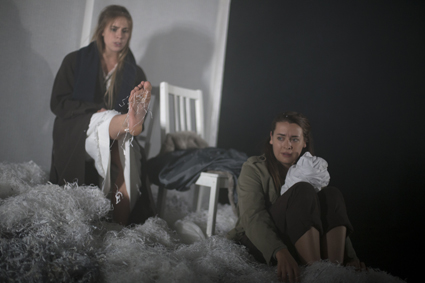Dark mothering
John Bailey: Katie Warner’s Dropped; The Rabble’s Frankenstein

Mary Hellen Sassman, Frankenstein, courtesy Malthouse
Entire industries have been built on the anxieties of motherhood, and it seems that when women aren’t being told how they’re doing it wrong they’re being sold something that will do it better. None of this makes it any easier when it comes to seriously examining the existential issues that face mothers. Two recent Melbourne productions take up that challenge, and by a fascinating coincidence do so in a manner that looks past the role of the mother as usually portrayed—that is, as something defined only in relation to a social function or family dynamic—to probe at the psychic workings of maternity itself as a state of mind.
Playwright Katy Warner and director Prue Clark’s Dropped is firmly in that oddly evergreen niche of the bunker play. Bunker plays see a small group of characters holed up in some subterranean concrete limbo while outside an apocalypse that may or may not be real ensures that the only exit remains firmly sealed. It’s a good way of allowing confinement to heighten tensions, bring up secrets, provoke a bit of shouting and so forth.
Dropped doesn’t dwell on the exact circumstances of its two characters, and is closer to Sartre’s Huis Clos in leaving its audiences to make what they will of their imprisonment. The two women are soldiers in some abandoned compound covered in a sheet of snow, which still falls ominously from above at intervals. Their shaky reality is made even more uncertain by the way their exchanges are based on shared fantasies, of an imaginary bottle of vodka, a passing dog and, most crucially, a baby.
One was once a real mother, we’re told, but there’s no reason to believe this any more than the other, patently false stories they swap. And the bundles of white swaddling supposed to represent various make-believe babies are made problematic when one emits a real child’s cry.

Brigid Gallacher, Matilda Reed, Dropped
photo Jessica Hogg
Brigid Gallacher, Matilda Reed, Dropped
There’s a pervasive sense of the passed over or left behind, and the shifting of realities suggests people who have never been afforded the tools to make sense of their own lives. The desire to carve out a solid psychic space is perhaps stymied by the equally powerful desire to share that with a child, but these two goals are contradictory, it is intimated, since the security symbolised by the bunker is the kind that stifles rather than promotes growth of any sort.
The form of Dropped doesn’t entirely do justice to the questions it raises. While its two protagonists are locked in by their own ignorance, the audience’s journey follows the more familiar trajectory of dramatic irony, as we become privy to the situation in which the women find themselves but are unable to move beyond. We’re ultimately heading towards the omniscience of gods, while the subjects before us are unable to achieve any narrative transcendence. To place a viewer in that same helpless state would be a bold and rare move, but it’s one that another local company has achieved with astonishing results.
The Rabble’s last work, Room of Regret, was explicitly concerned with architecture and the body, situating its audience and performers in a labyrinthine built environment. Frankenstein, conversely, returns the action to the ephemeral non-space of earlier works such as Orlando and Story of O, in which the set and all that unfolds within it refer to mental and emotional structures rather than material referents. A character stepping off stage doesn’t move to some other space projected by the illusion of the work, but simply ceases to be until they return. The stage is a claustrophobic box—the self unable to escape its own limits—but is also the entire universe as a result.
Mary Shelley’s telling of Victor Frankenstein’s overreaching hubris is here remodelled in an immediately striking way. Frankenstein (Mary Helen Sassman) is a woman who wants a baby and whose experiments in producing one involve locating a viable egg from among the thousands of black and squishy ovoids covering the floor, inseminating it with a syringe and depositing it in a huge, womblike incubator. After some false starts and with the aid of several lab assistants, the creature is born, and as incarnated by Jane Montgomery Griffiths is an unforgettable thing.
With a torso sprouting dozens of breast-like protuberances, the naked and bawling creature is every infant as monster, blubbering and howling and flailing at the world into which it has been dragged. It is a figure of pure need. Somehow Griffiths manages to invoke in the onlooker the desire to care for this pitiable child, at the same time enacting enough of the monstrous to allow us sympathy for Victor, who recoils from the thing’s relentless and insatiable desire for succour.
Alone, the dynamic that plays out between the two would be enough to propel this outstanding work, but the arrival of Victor’s brother and his predatory maleness complicate things further, as does the lust of one of Frankenstein’s assistants, who may embody the blind man who extends to Shelley’s original monster some kindness, the bride he demands Victor create and the young girl the monster kills in the 1931 film adaptation. It’s always hard to pin such referents down in The Rabble’s work, since all metaphors and similes here point in three directions or more. Indeed, the company has become increasingly adept at filling out these fantastic worlds with polyvalent symbols that cram so much possibility into such tiny containers that it’s rarely clear whether anything is more than the projected meaning of the individual onlooker.
The Rabble’s work is also known for consistently returning to horrific imagery, and Frankenstein is the most disturbing, indeed upsetting, of its creations thus far. There are at least two moments in this production that should challenge even the most jaded of witnesses, and many of the production’s implications will last in the conscious and subconscious mind long after the house lights are up. To venture so far into the darker recesses of the soul—and to do so in the name of motherhood, that supposed sanctuary of light—is something that deserves a response of awe.
Dropped, writer Katy Warner, director Prue Clark, performers Brigid Gallacher, Matilda Reed, lighting Amelia Lever-Davidson, sound Kahra Scott-James, design Lucy Thornett, La Mama Courthouse, 26 March-16 April; The Rabble, Frankenstein, direction, lighting, sound Emma Valente, design Kate Davis, performers Jane Montgomery Griffiths, Emily Milledge, Dana Miltins, David Paterson, Mary Helen Sassman, Malthouse Theatre, Melbourne, 21 March-5 April
RealTime issue #120 April-May 2014 pg. 41






